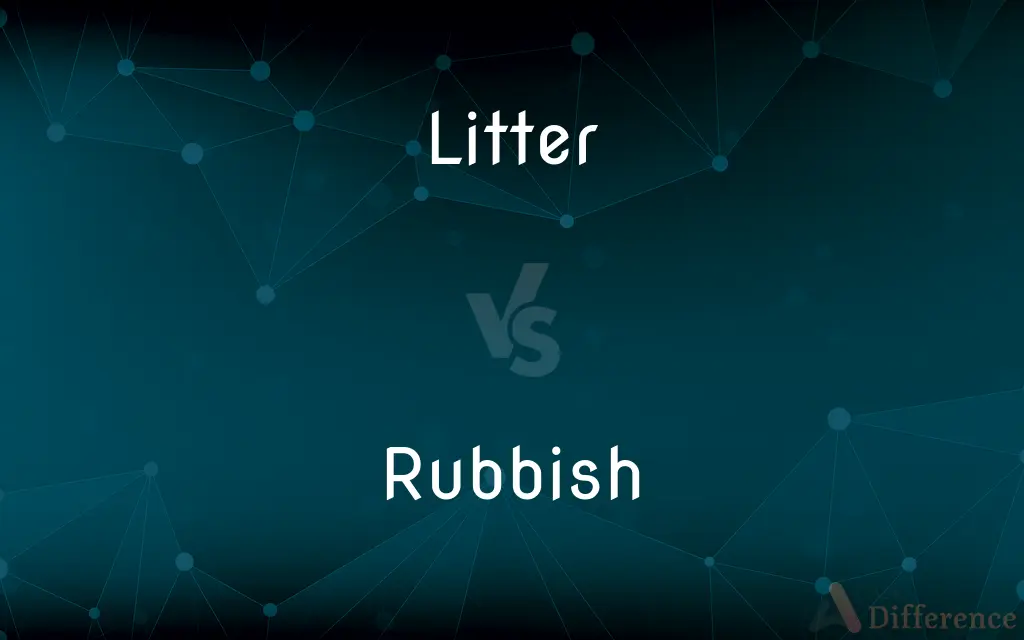Litter vs. Rubbish — What's the Difference?
By Maham Liaqat & Fiza Rafique — Updated on March 4, 2024
Litter refers to waste products improperly disposed of in public places, while rubbish encompasses general household waste and discarded items, regardless of location.

Difference Between Litter and Rubbish
Table of Contents
ADVERTISEMENT
Key Differences
Litter is specifically defined as waste that has been disposed of improperly, typically in public spaces, contributing to environmental pollution and visual blight. This can include items such as food wrappers, cigarette butts, and plastic bottles. On the other hand, rubbish is a broader term that refers to waste materials from households or commercial activities, including kitchen waste, broken appliances, and garden refuse. Rubbish may be properly disposed of in bins or taken to waste management facilities.
While littering is often associated with small items discarded carelessly in public areas, creating environmental and aesthetic issues, rubbish encompasses a wider variety of waste that can be both large and small, typically collected and managed by waste disposal services. The distinction highlights the social responsibility aspect of waste disposal, where littering is seen as an antisocial behavior due to its direct impact on public spaces.
The management of litter involves public education campaigns, fines, and community clean-up efforts to address its negative impact on the environment and public health. Conversely, managing rubbish usually entails organized collection services, recycling programs, and waste treatment processes to minimize its impact on the environment.
Public perceptions of litter and rubbish also differ; littering is widely condemned because it directly affects community spaces and natural environments, while the generation of rubbish is often viewed as an inevitable part of modern life, with the focus on responsible disposal and recycling.
This distinction between litter and rubbish is crucial for understanding environmental policies, waste management practices, and individual responsibilities towards maintaining clean and sustainable communities.
ADVERTISEMENT
Comparison Chart
Definition
Waste improperly disposed of in public places.
General waste from households or commercial activities.
Location
Public spaces, such as parks, streets, and beaches.
Generated at home or business, typically disposed of in bins or waste facilities.
Impact
Contributes to environmental pollution, visual blight.
Managed through organized collection and recycling, less immediate visual impact.
Examples
Food wrappers, cigarette butts, plastic bottles.
Kitchen waste, broken appliances, garden refuse.
Management
Public education, fines, community clean-ups.
Collection services, recycling programs, waste treatment.
Compare with Definitions
Litter
Waste improperly disposed of in public places.
Litter along the highway included soda cans and fast-food packaging.
Rubbish
Encompasses a wide variety of discarded items.
The rubbish collection included old furniture and garden waste.
Litter
Subject to fines and community clean-up efforts.
The city imposed fines for littering to keep the streets clean.
Rubbish
Less immediate visual impact when managed properly.
Properly disposed rubbish is contained until it can be processed or recycled.
Litter
Often consists of small, portable items.
Cigarette butts are a common form of litter found in urban areas.
Rubbish
General household and commercial waste.
After spring cleaning, the rubbish bins were overflowing.
Litter
Directly impacts public spaces and natural environments.
Litter on the beach poses a threat to marine life.
Rubbish
Focus on responsible disposal and recycling.
Sorting rubbish into recyclable and non-recyclable bins helps the environment.
Litter
Contributes to environmental and visual pollution.
The park was marred by litter scattered across its fields.
Rubbish
Typically collected and managed by waste disposal services.
Rubbish collection day is every Thursday morning.
Litter
Litter consists of waste products that have been discarded incorrectly, without consent, at an unsuitable location. Litter can also be used as a verb; to litter means to drop and leave objects, often man-made, such as aluminum cans, paper cups, food wrappers, cardboard boxes or plastic bottles on the ground, and leave them there indefinitely or for other people to dispose of as opposed to disposing of them correctly.
Rubbish
Waste material; refuse or litter
Householders may be charged for the removal of non-recyclable rubbish
Litter
Rubbish such as paper, cans, and bottles left lying in an open or public place
Always clear up after a picnic and never drop litter
A litter bin
Rubbish
Criticize severely and reject as worthless
He rubbished the idea of a European Community-wide carbon tax
Litter
Rubbish carelessly dropped or left about (especially in public places)
Rubbish
Refuse; garbage.
Litter
Make a place messy by strewing garbage around
Rubbish
Worthless material.
Rubbish
Worthless material that is to be disposed of
Common Curiosities
What types of materials can be found in rubbish?
Rubbish can contain a variety of materials, including organic waste, plastics, metals, and textiles.
Why is littering frowned upon?
Littering is seen as antisocial behavior because it directly impacts public cleanliness and environmental health.
What is the difference between litter and rubbish?
The key difference lies in disposal; litter is improperly disposed of in public, while rubbish is general waste, usually managed through organized disposal methods.
How often is rubbish collected in urban areas?
Rubbish collection frequency varies but often occurs weekly in urban areas.
What is considered rubbish?
Rubbish includes general waste from households or commercial activities, such as kitchen waste or broken appliances.
How can individuals reduce their rubbish output?
Reducing rubbish output involves minimizing waste, recycling, and choosing reusable products.
What is litter?
Litter refers to waste improperly disposed of in public places, often small items like wrappers or bottles.
Is it illegal to litter?
Yes, littering is illegal in many places and can result in fines or other penalties.
How does rubbish disposal impact landfill space?
Proper rubbish disposal and recycling can minimize the amount of waste sent to landfills, conserving space and resources.
How does litter impact the environment?
Litter contributes to pollution, harms wildlife, and creates visual blight in public spaces.
Can rubbish include recyclable materials?
Yes, rubbish often includes recyclable materials, which can be separated and processed to reduce waste.
What measures can prevent littering?
Measures include public education, fines for littering, and providing accessible waste disposal options.
What role do waste management facilities play in handling rubbish?
Waste management facilities process and recycle rubbish, reducing environmental impact.
Can community efforts reduce litter?
Community clean-ups and educational programs can significantly reduce litter in public spaces.
What are some common items that should not be littered?
Common items include plastic bottles, cigarette butts, and food packaging, which should always be properly disposed of to prevent pollution.
Share Your Discovery

Previous Comparison
Bow vs. Prow
Next Comparison
Adamant vs. ArrogantAuthor Spotlight
Written by
Maham LiaqatCo-written by
Fiza RafiqueFiza Rafique is a skilled content writer at AskDifference.com, where she meticulously refines and enhances written pieces. Drawing from her vast editorial expertise, Fiza ensures clarity, accuracy, and precision in every article. Passionate about language, she continually seeks to elevate the quality of content for readers worldwide.














































